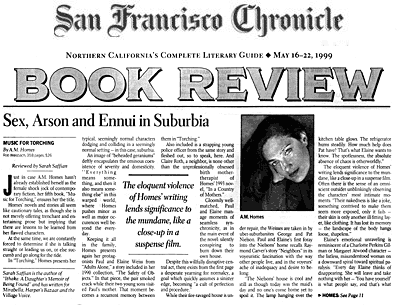MUSIC FOR TORCHING
By A.M. Homes
Rob Weisbach; 358 pages; $26
Just in case A.M. Homes hasn't already established herself as the female shock jock of contemporary fiction, her fifth book, "Music for Torching," ensures her the title.
Homes' novels and stories all seem like cautionary tales, as though she is not merely offering trenchant and entertaining prose but implying that there are lessons to be learned from her flawed characters. At the same time, we are constantly forced to determine if she is talking straight or leading us on, or else succumb and go along for the ride.
In "Torching," Homes presents her typical, seemingly normal characters dodging and colliding in a seemingly normal setting–in this case, suburbia. An image of "beheaded geraniums" deftly encapsulates the ominous coexistence of severity and domesticity. "Everything means something, and then it also means something else" in this warped world, where Homes pushes minor as well as major occurrences well beyond the everyday.
Keeping it all in the family, Homes presents again her protagonists Paul and Elaine Weiss from "Adults Alone," a story included in her 1990 collection, "The Safety of Objects." In that piece, the pair smoked crack while their two young sons visited Paul's mother. That moment becomes a recurrent memory between them in "Torching." Also included is a strapping young police officer from the same story and fleshed out, so to speak, here. And Claire Roth, a neighbor, is none other than the unprofessionally obsessed birth mother/therapist of Homes' 1993 novel, "In a Country of Mothers."
Gloomily well-matched, Paul and Elaine manage moments of seamless synchronicity, as in the main event of the novel: silently conspiring to burn down their own house. Despite this willfully disruptive central act, there exists from the first page a desperate yearning for normalcy, a goal which quickly assumes a sinister edge, becoming "a cult of perfection and procedure."
While their fire-ravaged house is under repair, the Weisses are taken in by uber-suburbanites George and Pat Nielson. Paul and Elaine's first foray into the Nielsons' home recalls Raymond Carver's story "Neighbors" in its voyeuristic fascination with the way other people live, and in the voyeurs' ache of inadequacy and desire to belong:
"The Nielsons' house is cool and still as though today was the maid's day and no one's come home yet to spoil it. The lamp hanging over the kitchen table glows. The refrigerator hums steadily. How much help does Pat have? That's what Elaine wants to know. The spotlessness, the absolute absence of chaos is otherworldly."
The eloquent violence of Homes' writing lends significance to the mundane, like a close-up in a suspense film. Often there is the sense of an omniscient outsider unblinkingly observing the characters' most intimate moments: "Their nakedness is like a joke, something contrived to make them seem more exposed, only it fails–their skin is only another ill-fitting layer, like clothing. It has lost its memory–the landscape of the body hangs loose, shapeless."
Elaine's emotional unraveling is reminiscent of a Charlotte Perkins Gilman or Margaret Atwood character–the listless, misunderstood woman on a downward spiral toward spiritual paralysis: "Every day Elaine thinks of disappearing. She will leave and take nothing with her–'You have yourself' is what people say, and that's what stops her. She fears she is nothing. Nonexistent."
Throughout "Torching," Homes' sense of humor is delightfully wicked, the kind that makes us cackle because it's right on the mark and because we're glad not to be any of these people. In addition to the explicit, rampant sexual activity, innuendo pervades the narrative like musk until the reader starts to feel like a pervert herself, looking for double entendres everywhere: "The workers arrive. They strap on their tool belts at the curb and let their hammers dangle."
Fans of Homes' habit of ending her books with a bang will not be disappointed with "Torching." While she jolts and titillates throughout, her finale is a knock-down, drag-out extravaganza of surreality. Though it could be argued that the conclusion of her 1996 pedophile's chronicle, "The End of Alice"–hyperbolically hailed as making "Nabokov's 'Lolita' seem like 'Leave It to Beaver'"–is fitting in its gruesomeness, here, as with "In a Country of Mothers," the ending comes across as excessive. The last chapter feels like a tacked-on denouement, the by-now-expected Homesian payoff.
If we must compare Homes to Nabokov, she falls short in being less disciplined, letting the finesse of her writing give way to sensationalism. A lesser craftsperson might need to resort to such over-the-top tactics, but Homes is most impressive when her incisive observations come unadorned.
Sarah Saffian is the author of "Ithaka: A Daughter's Memoir of Being Found" and has written for Mirabella, Harper's Bazaar, and the Village Voice.
Book Review
Music for Torching |
